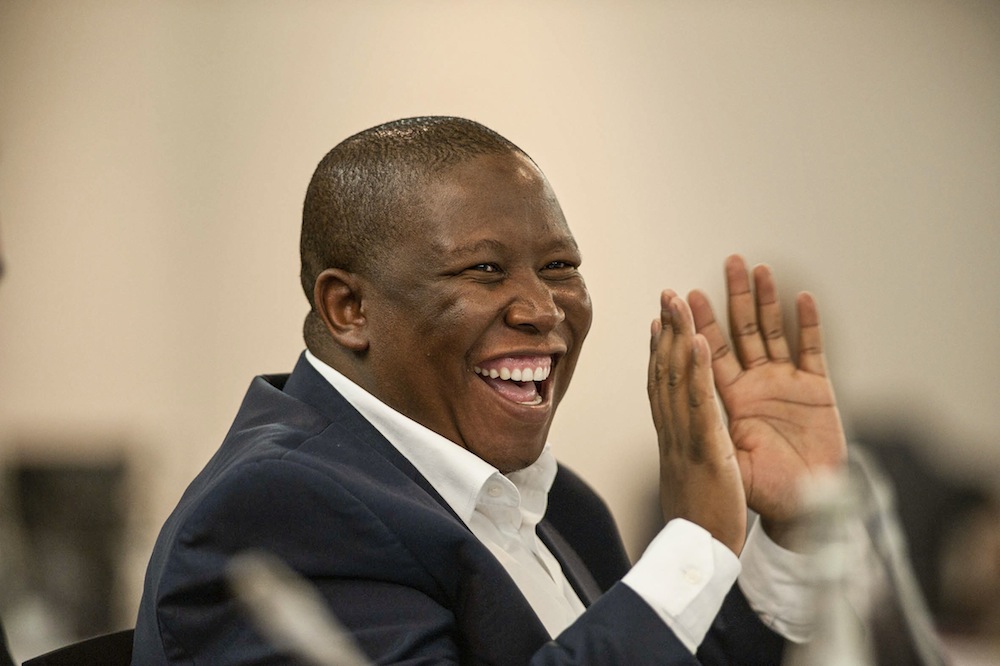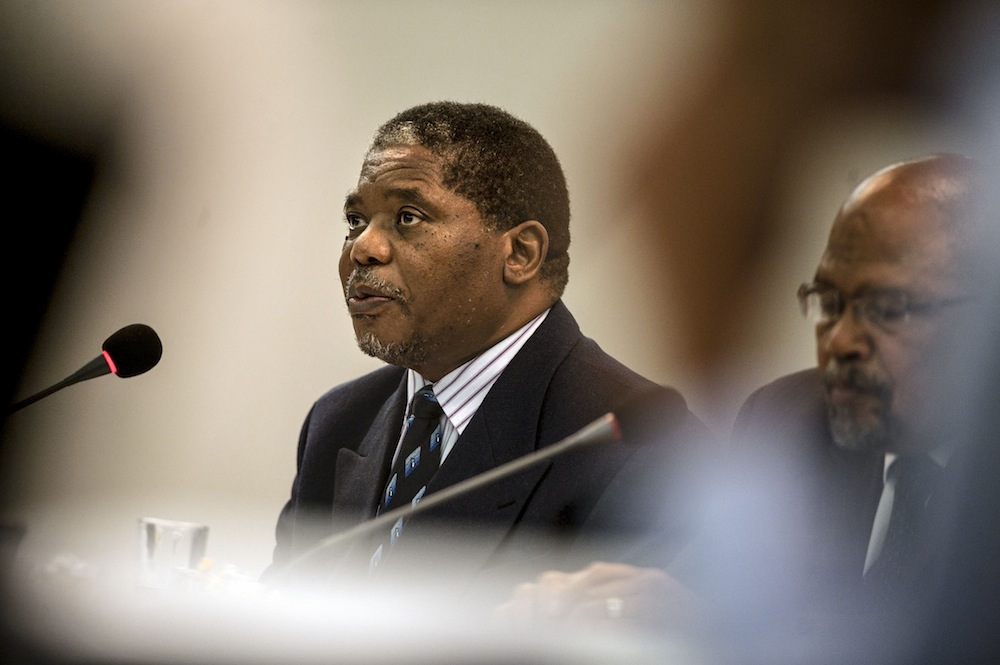Like the saltiness that floated in off the Atlantic Ocean and hung over the Sea Point hotel in Cape Town, the Constitutional Court’s judgment that found President Jacob Zuma had violated the country’s founding document weighed on the members of the Judicial Service Commission.
They were interviewing aspirant judges, in a week in which Zuma survived an impeachment vote in Parliament on Tuesday and public sentiment against the president appeared to be spiking.
Ten minutes into the first interview on Monday, of advocate Richard Brooks for a position in the Eastern Cape high court in Mthatha, the first sniff of Zuma’s beleaguered tenure emerged.
Commissioner Nomthandazo Ntlama, who has strong views on customary law and was there to represent the legal academics, asked Brooks whether Chief Justice Mogoeng Mogoeng had overstepped the bounds of the separation of powers in writing his judgment.
Brooks described the judgment as a “good, bold, brave restatement … of the principles of the rule of law, all interwoven with the separation of powers”.
Justice Minister Michael Masutha tried to salvage some face for his boss by peddling Zuma’s line that his refusal to pay back money for the Nkandla upgrades was the result of an erroneous legal response to the public protector’s report.
Masutha asked Brooks to comment on the view that “no one knows the law until the court of final instance [Constitutional Court] has pronounced on it”. Brooks said, in “many, many instances” there was certainty about the law, and that even the high courts were called upon to “define a new angle to the law” at times, rendering Masutha’s opinion reductive and simplistic.
In a partisan mini-duel fought throughout the interview, Economic Freedom Fighters leader Julius Malema responded by asking: “Can not knowing the law be an excuse in law?” Brooks said it depended on the circumstances. “If you are meant to know the law, there is no excuse for not knowing the law.”
Malema asked, whether an adult, “with many responsibilities, including signing off on the law, can you say that you don’t know the law?” “No,” said Brooks firmly.
Malema went on to use the judgment as the torch paper to set alight several metaphorical effigies of Zuma during the week. It was a public and brutal depiction of Zuma’s apparent self-aggrandisement, as Number One in the country – and not the Constitution.
At times, commission watchers were left wondering if Malema was pursuing some kind of judicial philosophy, or testing the legal opinion of some very sharp minds for a future court challenge.
“What would happen to our democracy if the arms of the state were used to second guess or deliberately ignore judgments?” he asked KwaZulu-Natal high court judge Trevor Gorven during his interview for a position on the Supreme Court of Appeal. “Ultimately, there would be a failure of democracy,” replied Gorven.
Malema then asked him whether judges could rule on whether public officials were “unfit to hold office”, and cited the Constitutional Court judgment that found Zuma had been irrational in appointing Menzi Simelane as the national director of public prosecutions as an example of this sort of judicial reach.
Gorven responded that he was “not sure if that was part of the order” or whether it had actually been “part of the reasoning in the judgment”.

Devil’s advocate: EFF leader Julius Malema’s questions made observers wonder if he was on a mission. (David Harrison)
The commission rescheduled Tuesday’s interview because MPs were required to attend the impeachment debate and vote. After the politicians had had their say in Parliament, Wednesday offered some respite from questions about Zuma during the interviews for the KwaZulu-Natal division.
Judge Mjabuliseni Madondo was finally recommended to the president for appointment as that division’s deputy judge president, after several previous attempts.
During a lighter moment, Inkatha Freedom Party MP Narend Singh noted a judgment Madondo had handed down in which he had made the distinction that merely because marijuana plants were growing on a person’s property did not mean they were trafficking the illegal substance.
Singh has been leading a passionate charge in Parliament for legislative reform to allow for the possession of marijuana for medical research purposes.
He said he welcomed the judgment and recounted how, during refurbishments to his home, he had held a party during which the police had paid him a visit and asked him: “‘Hey, Singh, are you growing dagga on your property?’ – and pointed to a marijuana plant. I then realised that the construction workers were having a good smoke,” said Singh.

Northern Cape Judge President Frans Kgomo came down hard on Western Cape judge Rosheni Allie. (David Harrison)
Any good humour had evaporated by the time the interviews for the Western Cape deputy judge president position began late on Wednesday night.
It emerged that Ziyad Motala, professor of law at Howard University in Washington DC, had sent the commission a copy of WhatsApp and email correspondence between a candidate, Western Cape high court Judge Rosheni Allie, and himself.
The conversation occurred in February 2014, when Mogoeng had circulated a draft document prescribing norms and standards for judges, including six-hour days in court and tighter deadlines for handing down judgments.
The document was criticised by some judges at the time and members of the Western Cape Bench had written to Mogoeng, raising concerns that the new rules infringed on their independence as judges and treated them like “civil servants”.
In private, Allie had been more vitriolic. Mogoeng was accused of “fruitless and wasteful expenditure” for his international travel with an “undemocratically elected” group of judges researching best practice to make the judiciary more effective. Allie had claimed he had “eight bodyguards” and medical emergency personnel on constant standby “in case any one of us has a headache”.
Mogoeng had recused himself from the interviews in advance and Supreme Court of Appeal president Lex Mpati chaired the interviews.
Northern Cape judge president Frans Kgomo led the charge against Allie’s apparent lack of discretion. He read more of the message, which included Allie describing a “sick roadshow by an individual with no conviction or insight”, and asked: “Who is this individual?”
Allie said it was a reference to Motala, who had claimed the project as his own, she said, and not Mogoeng. “The person you are referring to here is the chief justice,” Kgomo said.
He read further: former justice minister, the late Dullah Omar, “was known for his cronyism”, Allie’s fellow Western Cape Judge Nathan Erasmus was described as an “apartheid apparatchik” and appellate court Judge Stevan Majiedt “had compromised his independence for his personal gain”, Allie had claimed.
She said the comments were made during “a heated and robust exchange” and that she “unreservedly apologised to anyone offended by the WhatsApp” messages. She told the commission she had asked Motala not to go to the media with the correspondence and described his submitting it to the commission as an “unconscionable breach of trust between two friends”.
It didn’t matter. Allie had crucified herself – much like the president – through her actions.
• The JSC recommended the following for appointment:
Eastern Cape high court: Brooks for the Mthatha seat. The Port Elizabeth position was left vacant.
Supreme Court of Appeal: Judge Connie Mocumie and advocate Christiaan van der Merwe.
Western Cape high court: Patricia Goliat as deputy judge president.
KwaZulu-Natal high court: Madondo as deputy judge president; advocate Pieter Bezuidenhout SC and attorney Mokgere Masipa.